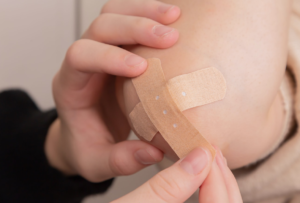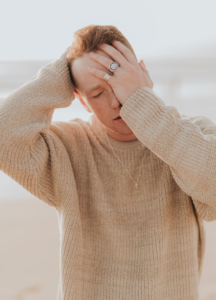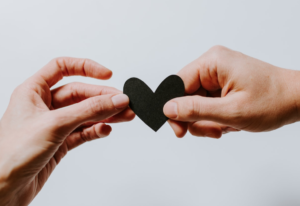Why do some people inflict self-harm?

Some people turn to self-injury or harm in response to emotional distress. These non-suicidal injuries are a way for a person to mirror psychological pain with physical pain.
But, as the person on the outside, witnessing self-harm to a loved one can be confusing and scary. The tendency is to jump to the idea that this person was trying to commit suicide when that is not usually the intent.
Why would someone choose to hurt themselves? There are a few reasons.
1.) Feeling pain can provide a distraction from what they are thinking. It focuses their attention on their physical feelings rather than thoughts and strong emotions. It allows them to regain some control.
2.) This intentional physical harm can provide a temporary calming effect, allowing them to release some of the tension associated with their strong emotions.
3.) It can be a way of “feeling something” when the person is emotionally numb or dissociated.
4.) It can be a form of expression when the person doesn’t know another way to communicate or document their strong emotions.
5.) A form of punishment. If they feel they are undeserving or have done something wrong this can be how they punish themselves.
6.) Self-harm can provide a temporary but intense feeling of euphoria immediately after.

How common is intentional self-injury?
Self-harm is not something you just see in movies. It is actually relatively common, so common in fact that March has been named Self-Injury Awareness Month. It is estimated that as many as 17 percent of teenagers and 5 percent of adults will experience some form of self-injury, according to the American Psychological Association. Self-injury commonly includes skin cutting, headbanging or hitting, and/or flesh burning.
Self-injury is not a healthy coping mechanism. It is not a sustainable way of managing emotions and/or relieving stress. It can cause permanent damage to a person’s body and puts them at risk for infection and death, if gone too far. It is important that if you suspect someone is inflicting self-harm they be provided the proper mental help so they can heal.
What to look for?
Those who inflict self-harm often find ways to hide their injuries from others. They choose places on their bodies that are easily covered with clothing and hide any tools they may use to inflict harm. That is why it is important to know the signs.
- Symptoms of consistent injury — if you notice your loved one frequently seems to have cuts, bruises, burns, or scabs on their arms, legs, or other parts of their bodies it is worth having a conversation
- Overdressing for the weather — wearing baggy clothes or long sleeves or pants when it is hot outside can be a big indicator that your loved one is trying to hide something

- Lots of excuses — if you ask your loved one about their frequent injuries and it seems like they are always coming up with an excuse it could be a sign they are hiding the real reason for the injury
- Avoiding, isolating, or withdrawing from activities. Your loved one might not be participating in swimming, sports, or other events because they are harming themselves and don’t want others to see or because they are depressed and are struggling with their emotions. If you see them isolating it could be time to consider counseling. A counseling professional can help your loved one to develop healthy coping mechanisms rather than turning to self-harm.
Ending Stigma
All mental health struggles carry some stigma causing people to be anxious or avoidant in seeking the help they need. But, self-harm carries even more embarrassment for the person. Often they will feel like they have no one to talk to or will feel ashamed at what they have done to their body. They will struggle to come forward about their problem because of their embarrassment.
People who turn to self-harm can be labeled attention-seeking, which only exasperates the problem. If you suspect someone you care about is struggling with self-harm be gentle, open, and careful in how you approach the topic. Let them know you are a safe place and you want to get them help. They need to feel comfortable confiding in you.

Offer Support Not Judgment
If someone is inflicting harm on themselves what they really need is support. They need to feel safe and not alone in their struggles. Help them to seek out a mental health counselor who they are comfortable with. Offer love and a listening, comforting ear, rather than judgment. You probably don’t understand why they are hurting themselves and that is ok. Do your best to stay calm and open-minded to their circumstances. It can also be helpful for you to seek counseling services for yourself to help you cope during these worrisome times.
Ready to begin counseling in Pennsylvania?
Counselors at CW Psychological Services are professionally-trained and licensed. We have openings for online, or telehealth, therapy appointments. Email us at [email protected] or call at (610) 308-7575. We are here for you.
